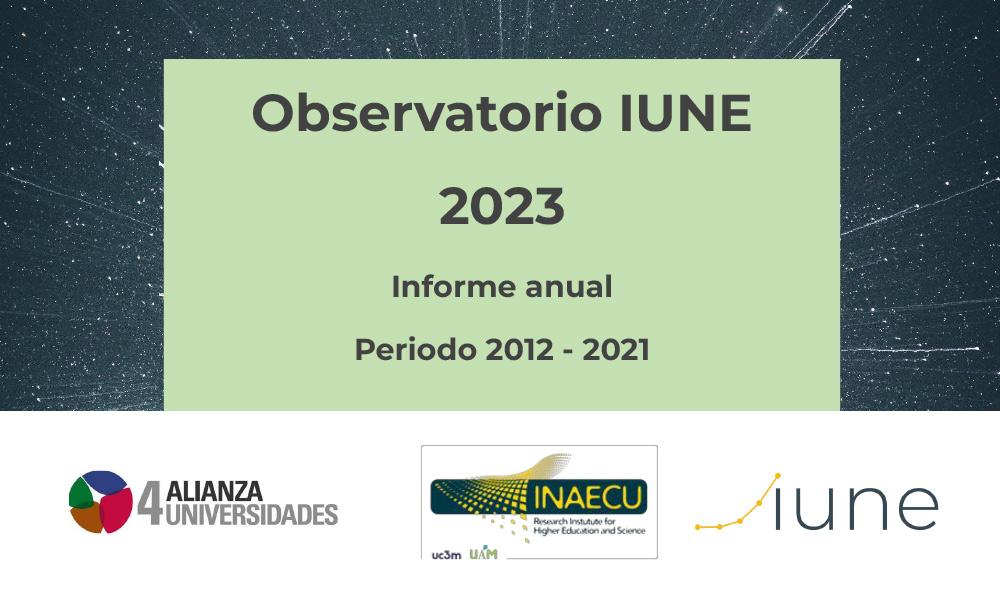Scientific production of universities has almost doubled in the last decade
According to data from the A4U Alliance’s IUNE 2023 Observatory
7/4/23
The scientific production of the Spanish University System (SUE, in its Spanish acronym) has grown considerably over the last decade, almost doubling from 60,294 publications in 2012 in the Web of Science (WoS) database to 102,987 publications in 2021, with an average annual growth of 7%. Public universities account for 92% of this production compared to 8% for private institutions, despite the fact that the teaching staff of private institutions have increased considerably in this period (by an average of 7.46%) as opposed to the negative growth of public university staff (by an average of -0.54%). This is some of the data from the IUNE Observatory's latest annual report, which has just been published and which belongs to the Alliance 4 Universities (A4U), formed by the Autónoma de Barcelona (UAB), Autónoma de Madrid (UAM), Carlos III de Madrid (UC3M) and Pompeu Fabra (UPF) universities.

This report, coordinated by the INAECU Institute (UAM-UC3M), monitors the SUE’s R+D+i, through 42 indicators based on seven major dimensions: scientific activity, analysis by areas of knowledge, educational capacity, competitiveness, funding, innovation and teaching staff. In general, "there is some deceleration in the decline in the SUE's main performance indicators that occurred in the years around the start of the 2008 financial crisis, as well as their gradual recovery in the years around 2020," the publication states.
Regarding productivity in research, the report notes that it has increased during the period studied. In this sense, as of 2018 all public universities have exceeded the value of one publication per lecturer per year. The universities that excel most in this area are the UPF, the UAB, the University of Barcelona (UB), the Rovira i Virgili University (URV), the UAM, the UC3M, the Miguel Hernández University (UMH), the University of Girona (UdG) and the University of Valencia (UV).
Regarding scientific collaboration data, approximately half of the publications are carried out with international co-authors, while almost a third of the publications are carried out in national collaborations. Emerging scientific production included in the ESCI (Emerging Sources Citation Index), which mainly includes Arts, Humanities and Social Sciences publications, has almost doubled since 2011, with public universities responsible for 89% of this.
The impact of the research carried out by Spanish universities has grown throughout the period studied, taking into account the number of annual citations. However, there has been a general stagnation in visibility when looking at publications in first quartile journals. In contrast, the number of open access publications has almost doubled since the start of the series, accounting for 68% of all publications in 2021.
Regarding innovative activity, the number of patents registered by the Spanish Patent and Trademark Office (OEPM, in its Spanish acronym) has been declining since 2015, reaching the minimum value of the series in 2020 and rising slightly in 2021.
The number of permanent lecturers (staff members and those with permanent contracts) in the SUE has increased between 2012 and 2021 due to the increase in the number of lecturers in private universities, which has grown in this period at a global annual rate of 7.46%. However, in that decade, public university staff have lost 3,750 lecturers (an average negative growth of -0.54%).
In terms of attracting and training talent, different trends are also observed, since while FPI and FPU contracts decreased moderately in the period studied, Juan de la Cierva contracts saw considerable growth. On the other hand, Ramón y Cajal contracts skyrocketed because the Juan de la Cierva incorporation contracts have been absorbed by the Ramón y Cajal call.
The IUNE Observatory is supported by the (Spanish) Ministry of Universities, as well as a large number of institutions, such as the (Spanish) National Quality Assessment and Accreditation Agency (ANECA, in its Spanish acronym), the Spanish University Rectors' Conference (CRUE, in its Spanish acronym), the Centre for Industrial Technological Development (CDTI, in its Spanish acronym), the Catalan University System Quality Agency (AQU Catalunya, in its Spanish acronym) and the Basque University System Quality Agency (Unibasq, in its Spanish acronym).
More information: https://iune.es/